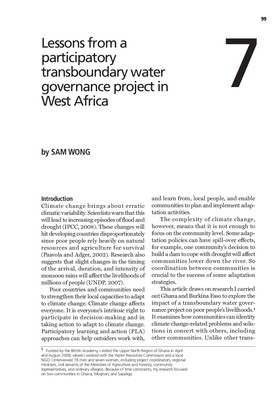Lessons from a transboundary water governance project in West Africa (PLA 60)

This article draws on research carried out in Ghana and Burkina Faso to explore the impact of a transboundary water governance project on poor people’s livelihoods. It examines how communities can identity climate change-related problems and solutions in concert with others, including other communities. Unlike other transboundary water governance arrangements, for example, in the Mekong or Nile river basins, this project demonstrates an attempt to include community members in the decision-making process. It also insisted that both genders were represented on the transboundary water committee. The article discusses the successes and limitations of the participatory approach used to involve communities in transboundary water governance and climate change adaptation activities.
Participatory Learning and Action (PLA, formerly PLA Notes) is the world's leading series on participatory learning and action approaches and methods. PLA publishes articles on participation aimed at practitioners, researchers, academics and activists. All articles are peer-reviewed by an international editorial board. See: www.planotes.org
Article in: PLA 60. Guest-edited by: Hannah Reid, Mozaharul Alam, Rachel Berger, Terry Cannon and Angela Milligan.
Keywords: CBA, climate change, adaptation, participation, DRR, disaster risk reduction.
To read the full table of contents or download whole issue (English and Arabic) please click on More information above.
Cite this publication
Available at https://www.iied.org/g02817